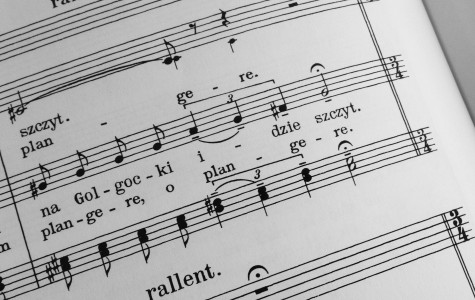Over the last few weeks one of our sopranos, Suzannah Lipmann, has been helping us wrap our tongues around the Polish text for our upcoming performances of Szymanowski’s Stabat Mater. Here she shares some insights into the process and how important singing the piece in Polish really is:
When I first joined London Philharmonic Choir in 2010 I was expecting to remain in-front of Neville, our choirmaster, not end up next to him! But in 2012 and now once more this season, I found that my bi-lingualism had a novel use, other than to eaves-drop in the tube on the 400,000 Poles who came to live here (I’m not a spy, really)!
Whilst I’ve been in various choirs since the age of 11, I’ve rarely sung in Polish. I’m quite au fait, as many of the LPC singers are, with singing in French, German, Italian, Latin, Spanish, Russian and even recently Japanese! However, apart from the odd Christmas carol, even I haven’t ever sung any ‘proper’ songs in Polish.
So, both in 2012 and now, singing the Szymanowski pieces in Polish, has been a real treat. While I can speak Polish fluently (bar the odd embarrassing grammatical mistake, or sounding very uncool when I use slang from my mum’s generation), singing in Polish is even for me, a bit of a mouthful!
Szczyt!

After the choir did such a good job of sounding Polish back in 2012, I jumped at the chance of coaching everyone again. This time, I was armed with my own Polish pronunciation guide, which I assiduously compiled and tested out on my colleagues at work.
However, while I was busy concentrating on the individual sounds, I unfortunately hadn’t anticipated the result of the choir trying to pronounce the word ‘Szczyt’! Needless to say, it has got to be the most harmonious profanity the choir has ever been heard to utter.
For those of you reading this, who aren’t familiar with this text, here’s a little how-to-guide:
‘Sz’ as in ‘schloss’ (in German), ‘cz’ as in ‘tschuss’ (in German), ‘yt’ as in ‘it’ (in English).
I’m just keeping my fingers crossed that it sounds right on the night at the Royal Festival Hall (or I may be in alorra szczyt)!
Spitting out the Meaning
Word-play aside, singing the Stabat Mater in Polish has for the first time emphasised the real meaning of the text for me. Without letting my Catholic guilt (on my mother’s side) and my Jewish guilt (on my father’s side) completely take over, I confess, I have never really checked the direct translation of Stabat Mater.
Only now, having read the text in Polish, has the pain and suffering of the Mother really been accentuated to me in a very palpable way through all the harsh and brutal consonants.
Hearing these, it suddenly made a lot of sense that Vladimir Jurowski would have us sing the Szymanowski in Polish, and not Latin. While many of the LPC singers may not realise just how raw and gritty the Polish translation is, with the choir often having to sing five consonants on one note (that has to be some kind of record!), I have implored them to enjoy spitting out the words at the row in-front of them as it will clearly make the point and get the message across!
I now look forward to returning to the ranks of the choir and the right side of Neville and Vladimir at The Royal Festival Hall next week.
The London Philharmonic Choir will perform Szymanowski’s Stabat Mater with Vladimir Jurowski and the London Philharmonic Orchestra on Saturday 5 March at the Royal Festival Hall and again on Friday 11 March at the Palais des Beaux-Arts in Brussels.



